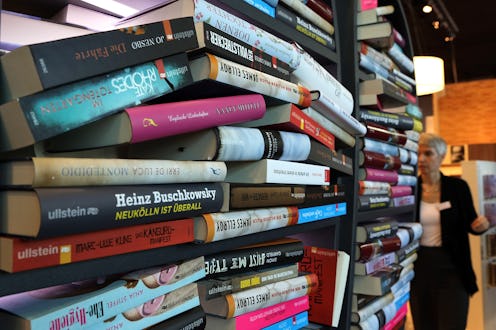Books
Stop Calling For the Demise Of Publishing Houses
Debates about the future of publishing in the digital age have been ongoing for a long time, and have been made all the more salient by the ongoing dispute between Amazon and the publishing house Hachette. There are people who think Amazon is in the right, and people who think Amazon is on track to ruin publishing and books culture in America — and then there's at least one person who apparently thinks both of these things at once, as evidenced by Matt Yglesias' Vox article, "Amazon is doing the world a favor by crushing book publishers." In it, Yglesias argues that not only will Amazon inevitably cause the collapse of traditional publishing houses, but that we should all be eagerly awaiting the day when they do.
The article brings up many points to support this claim — most of them not new — but it ultimately fails to make me remotely optimistic about an Amazon-controlled publishing industry. And make no mistake: No matter what this article implies about other places to purchase both hard copy books and e-books, if traditional publishing houses collapse, Amazon will be the only thing properly poised to fill that void. Yglesias doesn't discuss what a post-publishing house world might look like, but given Amazon's dominant place in the industry right now, they would most likely take over, and that's a frightening possibility.
In the article, Yglesias points out that major book publishers are also large companies, and are owned by huge media conglomerates, as though only things that can be described as a "cuddly craft affair" or a "tiny, helpless [enterprise]" are worthwhile. He argues that Amazon faces plenty of competition, while ignoring the fact that it accounts for 50 percent of all books sold in the United States. He makes the case that Amazon's control would make books more affordable — which is potentially true, though not a gamble I personally consider worth the collapse of a traditional publishing models. And he claims that publishing houses deserve to get "squeezed out" because "they don't contribute anything of value." Which just... what?
Despite Yglesias' belief that publishers are terrible at marketing and his apparent conviction that this means they have no other possible function, publishers are actually crucial for book culture. For one thing, editors help make the manuscripts they acquire even better, thereby raising the quality of literature in all forms for everyone. Without the current system, in which publishing houses employ editors to help polish would-be books, the books we know and love would never have become as good as they are, which would be a shame for everyone. Self-publishing through Amazon, by contrast, requires authors to pay upfront costs to even get spelling and grammar checked, and never guarantees the kind of in-depth attention that publishing house editors are known for.
For another — perhaps even more important — thing, having publishing houses helps readers determine which types of books they want to read, which is even more important in the Internet age, heavy as it is on information while being light on context. It's unclear from this article what Yglesias thinks book production would look like in a post-publishing house world, but one very real possibility is that everything would simply be self-published, which would mean absolute chaos. Self-publishers generally even more notoriously terrible at marketing than Yglesias thinks publishing houses are.
Imagine trying to wade through a sea of self-designed covers heavy on stock photos and self-written blurbs. There is a reason authors shouldn't write their own blurbs: They are bad at writing them. Plus, the sheer volume of material would be enough to drive a book lover away from books.
Not to mention it would leave those of us who prefer not reading our books on a screen completely in a lurch since self-publishing rarely involves producing hard copies.
Then again, maybe we are to assume that Amazon will expand its publishing role and become a de facto publishing house, which doesn't seem much better, given the things that this Hachette feud have suggested about its potential bias and its willingness to selectively keep books from consumers. After all, they've been extending shipping times, upping prices, and removing pre-order buttons on Hachette titles as a negotiating tactic. If they exercise that willingness due to squabbles with authors rather than publishing houses, are we really better off?
Plus, Amazon still fails to consistently turn even a modest profit, and is currently dealing with a major drop in sales, with most of it coming from book sales. Do we really want to trust the cultural staple that books represent to such an unstable entity?
It is understandable for Yglesias to be frustrated with book publishers, though not necessarily for the reasons he brings up in this piece. Publishing houses have been unreasonably slow in responding to new technology and adapting for the digital age. They also have a terrible track record on diversity. But to call for their demise — and to do so without even speculating what that demise might mean or what might come after — is just short-Sighted.
So please, take whatever sides you want in the Amazon Hachette dispute, but please don't gleefully call for the demise of book publishing as we know it.
Images: Giphy
